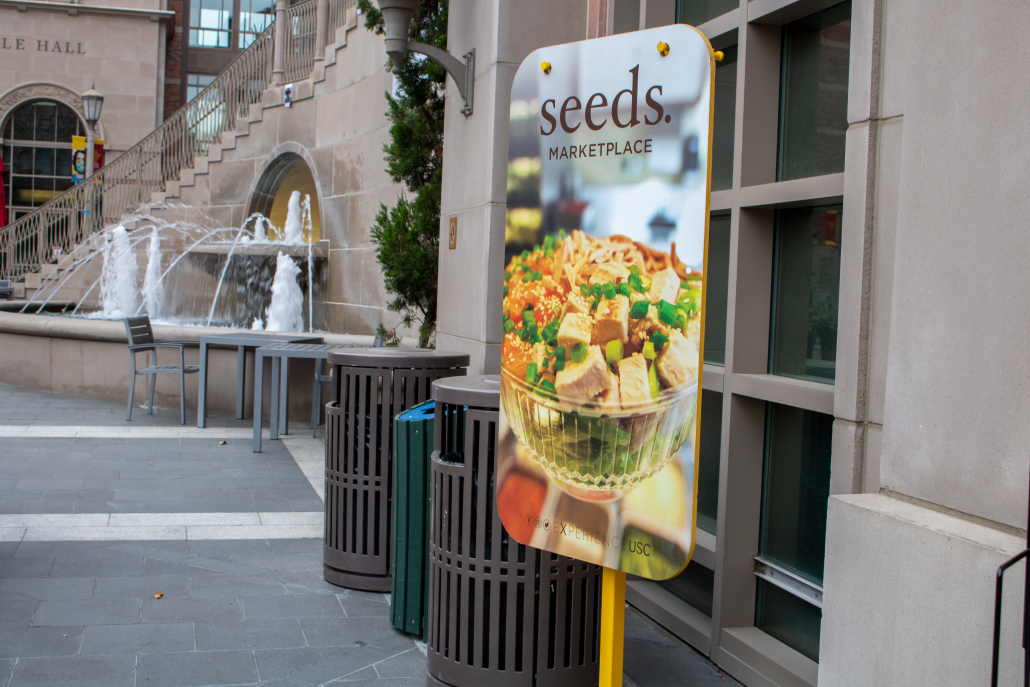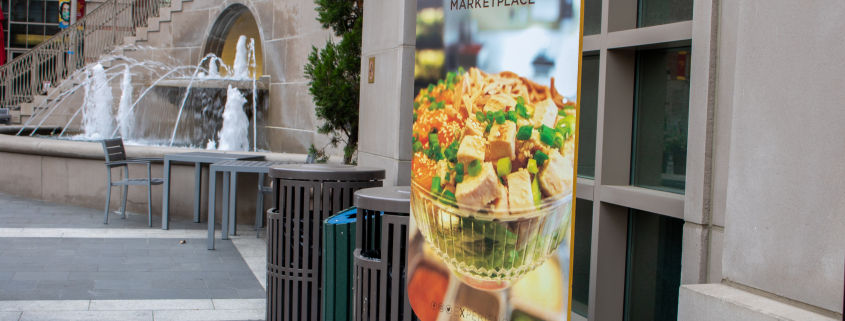Los Angeles implements disposables-on-request law

An ordinance requiring all food and beverage-serving facilities to provide disposable utensils, napkins and other foodware only upon request went into effect in the City of Los Angeles Nov. 15. The new law, part of the city’s sustainability efforts to reduce plastic waste, applies to both dine-in and take-out facilities — including all USC residential dining halls, the quick service restaurants at Ronald Tutor Campus Center and all other campus food venues.
The ordinance follows the city’s Straws-on-Request ordinance, a law requiring straws only to be given if restaurant customers ask for them, which took effect in October 2019. Ahead of the citywide move, USC Hospitality banned the use of straws in dining halls in 2018. USC Hospitality, at the time of publication, has eliminated 95% of disposable foodware items, such as sugar packets and condiments, that it provided in the past.
In an informational presentation to businesses about the details of the new ordinance on Nov. 8, L.A. Sanitation & Environment described the environmental impacts of plastic waste, explaining that plastics are non-compostable. The presentation cited the increased dependence on takeout and food delivery over the course of the coronavirus pandemic, which caused a surge in the amount of disposable foodware accessories used worldwide by approximately 250 to 300%.
While complaint-based enforcement does not begin until May 15, businesses and food-serving facilities across the city have already begun enforcing the new law, including dining halls and restaurants on campus.
“USC Hospitality is aware of the ordinance and has made changes to its operations to ensure compliance,” wrote Dirk De Jong, assistant vice president of USC Auxiliary Services, in an email to the Daily Trojan. “We are taking our sustainability efforts a step further by providing compostable disposables upon request.”
Erikk Gonzalez, an employee at Seeds Marketplace said that, since the new law went into effect, he has seen a positive change in his work environment. Gonzalez, who has worked at Seeds for about a month, also said customers have become more mindful of the amount of utensils they use.
“[Seeds is] cleaner … People are more organized,” Gonzalez said. “You save more. [Some people used to] take four forks and throw away two.”
Kathy Thach, a freshman majoring in philosophy, politics and law, said she hasn’t seen a change in her plastic use since the new ordinance was implemented.
“I don’t really see a difference in general on a large scale,” Thach said. “In terms of this new L.A. ordinance … trying to solve the problem of plastic pollution, I think it’s just another tactic to blame individual people with the facade of being eco-friendly.”
Thach said that, when it comes to the conversation about pollution as a whole, more focus is placed on the impact of individual consumption rather than that of corporations.
“This is just another one of those conversations that surrounds plastic, and I feel like nothing ever really changes,” Thach said.
Reducing the use of disposable plastics is a key component of USC’s sustainability goals, wrote Chief Sustainability Officer Mick Dalrymple in an email to the Daily Trojan.
“Eliminating non-essential, single-use plastics is one of USC’s initiatives to achieve our zero waste goals,” Dalrymple wrote.
Dalrymple, USC’s first chief sustainability officer, heads the Office of Sustainability and currently assists administration in developing the Sustainability 2028 Plan. The plan, which is expected to be published next spring, will outline USC’s long-term sustainability initiatives, including the administration’s consideration of a University-wide ban on single-use plastics.
Dalrymple wrote that he sees the ordinance as a “next step” that “makes sense” in the context of the University’s greater sustainability goals.
“Nature doesn’t understand the terms ‘waste’ or ‘disposable,’ because all resources are reused in nature,” Dalrymple wrote. “Hopefully, one day people will no longer remember those terms and will look back, astonished at how many valuable resources were squandered.”

